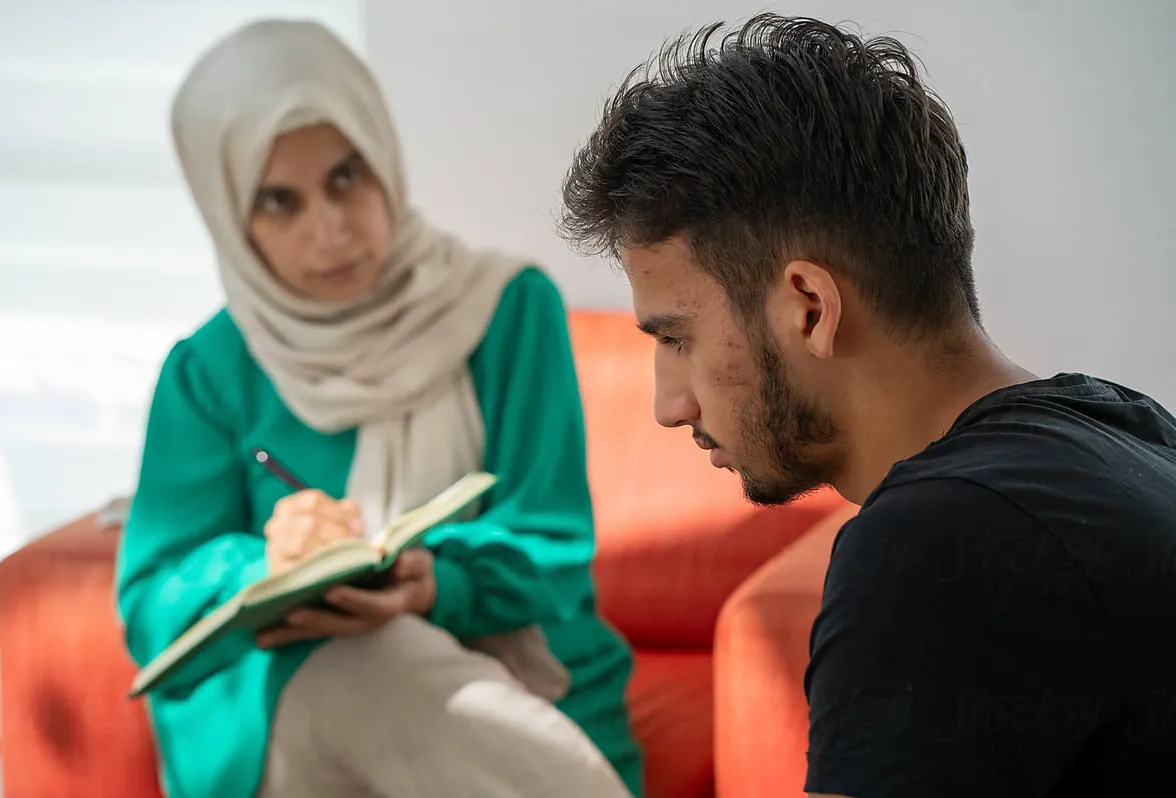
Taking the first step toward better mental health is a significant decision. For many, finding a professional who understands your cultural and spiritual values is crucial for building trust and making progress. This guide is designed to help you navigate the process of finding a top Muslim therapist in Texas. Whether you are looking for a therapist in a private practice or need help searching for the right fit, you will find valuable resources here to support your journey toward healing and well-being.
Locating the right Muslim therapist in Texas for your mental health journey involves knowing where to look. Specialized online resources, such as a directory of Muslim therapists, have made this process much more accessible. These platforms list professionals across the state, from Houston to Dallas, allowing you to filter based on your specific needs.
Many of these professionals operate in a private practice, offering a personalized approach to care. You can find male and female therapists, ensuring you can connect with someone you feel comfortable with. Taking the time to browse these directories is an excellent first step toward finding the support you deserve.
When searching for a Muslim therapist, start with trusted platforms. A dedicated directory of Muslim therapists, like the Muslim Therapist Directory, is an invaluable resource. These sites often pre-verify licenses, but it is always a good practice to double-check. You can verify a therapist’s credentials by checking with the Texas State Board of Examiners for their respective license (e.g., LPC, LCSW, LMFT).
Therapist profiles on these directories or their private practice websites usually list their qualifications and licenses. Look for these credentials to ensure they meet professional standards. This verification step gives you peace of mind that you are choosing a qualified professional.
Ultimately, using a combination of a specialized directory and state verification ensures you find a credible and skilled Muslim therapist. This process helps you build a foundation of trust before your first session even begins. Source 1, Source 2.
Identifying a therapist who specializes in faith-based or Islamic counseling requires a close look at their professional profile. Many therapists will explicitly state these specializations in their biographies or service descriptions. Look for keywords that signal their approach to integrating spirituality with therapy.
A therapist who offers this type of care understands that your faith is a source of strength and can be a core part of your healing process. They create a therapeutic environment where your beliefs are respected and incorporated into the treatment plan. This approach can lead to a more profound sense of alignment between your spiritual and mental well-being.
To confirm a therapist’s focus, look for:
Across Texas, from bustling cities like Houston to suburbs like Sugar Land, you have access to a variety of mental health services from Muslim therapists. These professionals, often found through a directory of Muslim therapists or in private practice, offer support tailored to the community's unique needs. The benefit of choosing a Muslim therapist is their intrinsic understanding of your cultural and religious context.
This understanding allows for a deeper therapeutic connection and more effective treatment. Whether you need individual support, couples counseling, or services in a specific language like Urdu or Arabic, options are available. The following sections will explore these counseling formats and the availability of multilingual therapists in more detail.
Muslim therapists in Texas offer counseling in various formats to meet diverse needs. Individual therapy is ideal for young adults and others working through personal challenges like anxiety, depression, or self-esteem. These one-on-one sessions provide a confidential space to explore your thoughts and feelings.
For those facing relational challenges, couples and family therapy are excellent options. Therapists like Mohammad Ali Zafar specialize in couples counseling, while others like Umaimah Maryam work with families to improve communication and resolve conflicts. These services are vital for building healthier, more resilient relationships within an Islamic framework.
Many therapists use evidence-based approaches like cognitive behavioral therapy to help you achieve your goals. Here is a breakdown of common therapy types:

Feeling understood is key to successful therapy, and for some, that includes speaking with a therapist of a specific gender or in their native language. Fortunately, the network of Muslim therapists in Texas is diverse, ensuring you can find a professional who meets your preferences. Many highly qualified Muslim female therapists, such as Sara Bawany and Fariah Zainuddin, are available throughout the state.
Additionally, if you are more comfortable expressing yourself in Urdu or Arabic, you can find therapists who are fluent in these languages. This can be especially helpful in family therapy, where complex emotions and cultural nuances are often discussed. Being able to communicate in the language of your heart can make a significant difference in your therapeutic experience.
You can find therapists who offer:

When you begin sessions with a Muslim therapist, you can expect a welcoming and non-judgmental environment. Your first meeting will likely focus on getting to know you, understanding your concerns, and discussing your goals for your mental health. This is a space where your faith is seen as a strength, not an obstacle.
Your therapist will collaborate with you to create a treatment plan that feels right. For young adults and others, this might involve techniques like cognitive behavioral therapy tailored to a faith-based perspective. The following sections will cover some common therapeutic approaches and how faith is sensitively integrated into your sessions.
Muslim therapists in Texas are trained in a variety of evidence-based psychological techniques to support your mental health. They skillfully blend these modern methods with an understanding of Islamic principles to provide comprehensive care. You are not just a set of symptoms; you are a whole person with a unique background.
One of the most common approaches is cognitive behavioral therapy (CBT), which helps you identify and change negative thought patterns and behaviors. Other therapists may use specialized techniques like Eye Movement Desensitization and Reprocessing (EMDR) for trauma or Gottman Method Couples Therapy for relationship issues. In family therapy, a systems approach is often used to understand and improve group dynamics.
Therapists may be trained in:
One of the greatest benefits of choosing a Muslim therapist is their ability to integrate cultural and religious understanding into the healing process. This integration goes beyond simply acknowledging your faith; it involves actively using Islamic concepts as tools for growth and resilience. This approach validates your identity and makes therapy more relatable and effective.
A therapist offering faith-based counseling might reference principles of patience (sabr), gratitude (shukr), and trust in God (tawakkul) to help you frame your challenges. For instance, Ayesha Farooqui reminds clients, "Allah is moulding you into something great," turning a struggle into a journey of spiritual development. This perspective helps you connect your mental health work with your core beliefs.
This blend of psychological science and spiritual wisdom is what makes working with a Muslim therapist unique. It provides a holistic path to wellness that nurtures your mind, heart, and soul, which is especially powerful in contexts like family therapy where cultural values are central.
Once you have found a potential Muslim therapist, the next steps involve booking, figuring out payment, and deciding on a session format. Many therapists have a private practice with a straightforward booking process outlined on their websites. You can also use a directory of Muslim therapists to find their contact information directly.
Navigating insurance and exploring virtual therapy are also key parts of accessing mental health care. Fortunately, many providers accept insurance, and telehealth has become a widely available option. The following sections provide a clear guide on how to book an appointment and explore these flexible options.
Booking an appointment with a Muslim therapist is a simple process. After identifying a therapist through a directory or referral, the next step is to reach out to their private practice. Most therapists have a contact form on their website or provide a phone number or email for inquiries.
When you make contact, you can ask about their availability, services, and insurance coverage. Many therapists in Texas accept a range of insurance plans, but it is always best to confirm. Ask them directly if they are in-network with your provider or if they offer superbills for out-of-network reimbursement.
Here are the basic steps to follow:
In today's digital world, accessing mental health support is more convenient than ever, thanks to online therapy and telehealth. Many Muslim therapists in Texas offer virtual sessions, allowing you to receive high-quality care from the comfort of your home. This is especially beneficial if you live in a remote area or have a busy schedule.
Telehealth removes geographical barriers, expanding your options beyond your immediate city. You can connect with the best Muslim therapist for your needs, regardless of where they are located within the state. Platforms like Ruh Care specialize in online therapy, connecting clients with therapists across the United States.
This flexibility ensures that consistent, culturally sensitive mental health care is accessible to more people. Whether you prefer video calls or phone sessions, online therapy provides a practical and effective way to prioritize your well-being.
In conclusion, finding the right Muslim therapist in Texas can significantly enhance your mental health journey. With a range of specialized services and culturally sensitive approaches, these professionals offer support tailored to your unique needs. Whether you're seeking individual, couples, or family counseling, you can rest assured knowing that qualified therapists are available to help you navigate challenges while integrating your faith and values. Take the first step towards better mental health today—reach out to explore your options and book your consultation.
You can find a Muslim therapist at Riaz Counseling, which has multiple Muslim professionals on staff in Houston. You can also use a directory of Muslim therapists or check with local mosques for recommendations to find a private practice that suits your mental health needs.
For stress-related mental health support, Riaz Counseling is available to help. Please reach out through our contact form to schedule a consultation. Many other Muslim therapists in private practice also specialize in stress management and offer effective counseling techniques.
Yes, many Muslim therapists in Texas offer couples therapy and family therapy. Professionals listed in directories often specify these services in their private practice profiles, helping you find the right support for your relationships.
To confirm insurance coverage, check the therapist's profile in a directory or on their website. The best way is to contact their office directly and ask if they accept your specific insurance plan for mental health services.
Absolutely. Most Muslim therapists in Houston and across Texas offer online therapy and telehealth sessions. This flexible option makes it easy to access consistent mental health support from anywhere, ensuring you can connect with the right therapist for you.
If you feel that you or someone you know, may benefit from therapy, please reach out to our office for a FREE 15 minute consultation: LINK
Stay informed about the latest research in psychology.
.png)
Explore how Internal Family Systems (IFS) therapy heals trauma and restores self-leadership.
.png)
Explore how Internal Family Systems (IFS) therapy heals trauma, anxiety, and inner conflict.
.png)
A practical guide to recognizing, preventing, and healing teacher burnout in Houston schools.